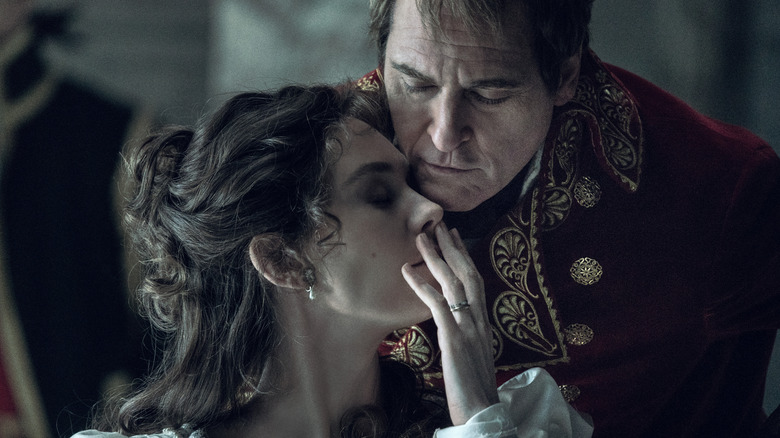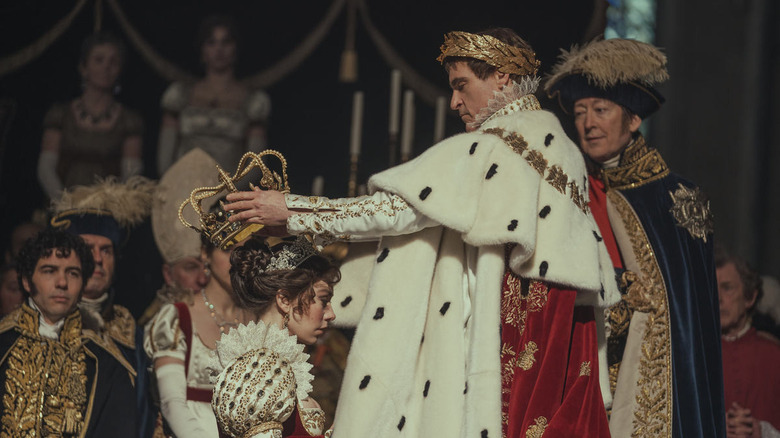Napoleon Didn't Divorce Josephine - He Was Way More Nefarious
Contains spoilers for "Napoleon"
Ridley Scott's epic new biopic "Napoleon" is a tale of two parts for the lead character. On the one hand, the movie rapidly skips through Napoleon Bonaparte's (Joaquin Phoenix) military career, highlighting major events, including the battles of Austerlitz, Borodino, and Waterloo. On the other hand, the film focuses on Bonaparte's quirky and complicated connection with his wife, Josephine (Vanessa Kirby). The dictator is head over heels for his consort, and he remains committed to her until he publicly divorces her several years into their marriage. According to one major historical source, though, it turns out that the man didn't take a direct path to breaking off his marriage. Rather, he had it annulled on a technicality.
According to the Encyclopedia Britannica, Napoleon had his marriage to Josephine nullified in 1810. The grounds for the annulment? The parish priest hadn't been physically present during the original ceremony in 1804. Breaking off the relationship had nothing to do with the fact that Josephine had failed to provide him with a male heir to his new French empire. Technically speaking, the dictator was simply acknowledging that the marriage he had been totally cool with for over half a decade was actually not legitimate since the correct official hadn't been in the room at the time.
Britannica bluntly points out that this is a very minor irregularity to use as a reason to end a multi-year royal marriage. The reputable historical resource also goes so far as to claim that Napoleon's move at least appears to have been premeditated specifically to avoid the need to resort to an all-out divorce if his significantly older wife couldn't bear children.
Scott's handling of the divorce ceremony was still spot-on
The thought that Napoleon Bonaparte would have given himself an out even when it came to marrying the woman he loved casts that entire part of the movie in a different light. In Scott's adaptation, Napoleon looks frazzled and frustrated. He's pushed by his mother to sleep with another woman to see if he can actually conceive children (historically, the man appears to have had affairs without the need for motherly input), and when his mistress becomes pregnant, he reluctantly agrees to divorce Josephine "for the good of the empire." If he was actually ready to end things all along, it shifts the tone. Rather than seeing him as a helpless romantic who can't produce an heir, it reveals a monster-of-a-monarch who, even in his most intimate personal affairs, was still thinking about his geo-political destiny.
In the film, Napoleon's marital fallout consists of a stressful scene where Bonaparte forces Josephine, who can't help but laugh at her misfortune, to sign the divorce documents. Apart from the annulment versus divorce detail, the rest of Ridley Scott's representation of the scene is fairly accurate. Smithsonian Magazine explains that the couple shared kind words with one another, but Josephine's heroic prepared statement is interrupted by her emotional distress over the reality of her situation. Both that publication and PBS even use terms like divorce ceremony and imperial divorce.
So, while Napoleon does break off his marriage on a technicality, it's worth pointing out that it's generally referred to as a divorce. Still, the fact that it wasn't exactly that, but rather an annulment, is an important detail. It indicates that the Emperor was crafty and conniving, even in areas of life as important as devotion to one's spouse.

